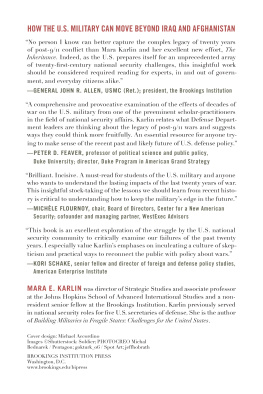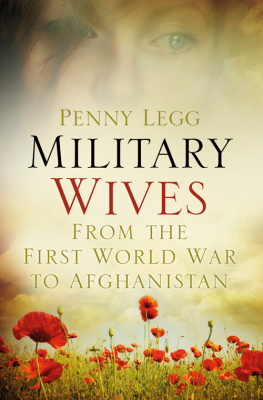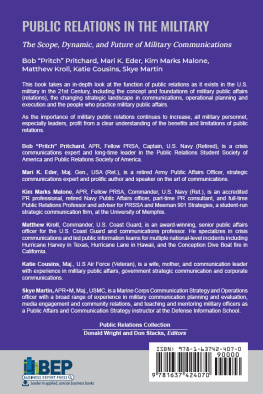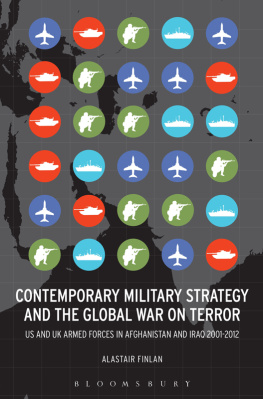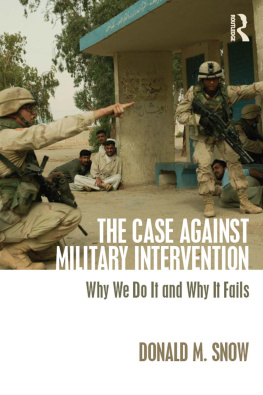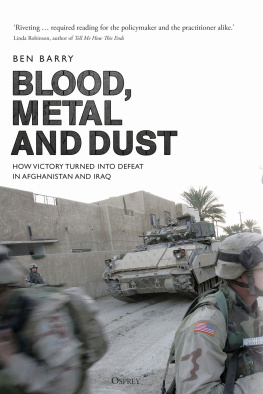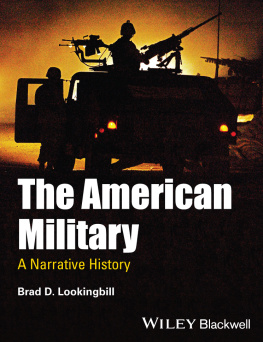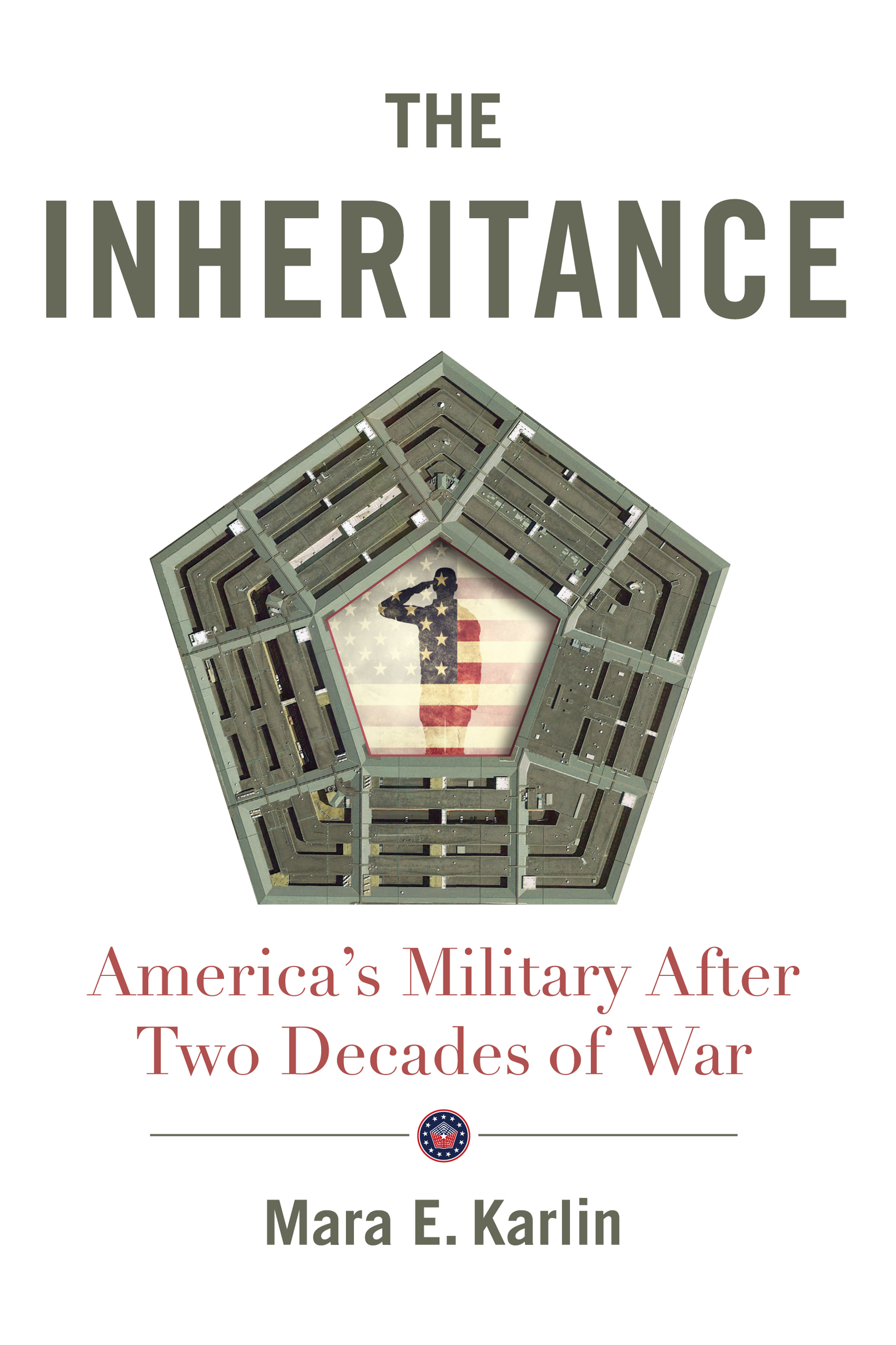Contents
Guide
Pagebreaks of the print version
THE
INHERITANCE
Americas Military after Two Decades of War
MARA E. KARLIN
BROOKINGS INSTITUTION PRESS
Washington, D.C.
Copyright 2022
THE BROOKINGS INSTITUTION
1775 Massachusetts Avenue, N.W.
Washington, D.C. 20036
www.brookings.edu
All rights reserved. No part of this publication may be reproduced or transmitted in any form or by any means without permission in writing from the Brookings Institution Press.
The Brookings Institution is a private nonprofit organization devoted to research, education, and publication on important issues of domestic and foreign policy. Its principal purpose is to bring the highest quality independent research and analysis to bear on current and emerging policy problems. Interpretations or conclusions in Brookings publications should be understood to be solely those of the authors.
Library of Congress Control Number: 2021946136
ISBN 9780815738459 (pbk)
ISBN 9780815738466 (ebook)
9 8 7 6 5 4 3 2 1
Typeset in Calluna
Composition by Elliott Beard
To Mom and Dad with immense gratitude
- Contents
Acknowledgments
I kept hoping someone else would write this book. It is a terrifyingly immense topicand a terrifyingly critical one at thatand I was concerned about doing it justice, about ensuring that this exploration of the legacies of the post-9/11 wars was thoughtful, rigorous, and respectful. Nevertheless, the book needed to be written and I hope that this effort represents a reasonable attempt to tackle this thorny, unwieldy, and visceral topic.
There are many, many people who played an integral role in helping me research and write this book. Above all, I want to express my deepest gratitude to those who sat for interviews; without their insights, this book would be a shell of itself. I simply cannot thank my dear colleague and friend Paula Thornhill enough for her endless wisdom, extraordinary support, and frank feedback. A number of tremendous colleagues read drafts and offered their constructive inputs throughout this process, including Scott Cooper, Jim Mitre, Nina Wagner, Kaleb Redden, Susanna Blume, Ethan Saxon, Alice Friend, Loren DeJonge Schulman, Alex Pascal, Nora Bensahel, and Dave Barno. Five different graduate student research assistants spent long days and nights shaping this manuscript over the last few years. Kathryn Olson and Jon Austin helped in the early stages, Chenny Zhang was critical to the structure and organization, and Phoebe Benich and Sam Wilkins played massive roles in researching and editing what were often rather hideously formulated ideas and drafts. Their consistent support and enthusiasm were remarkable and Im honored to have worked with each of these young professionals. I am also indebted to Jeb Benkowski, whose immense talent and indefatigable approach improve everything he touches.
I feel very lucky to be part of the U.S. national security and foreign policy community. My former colleagues from the Pentagon during my nearly ten years of service there shaped my thinking in countless ways, as have my current colleagues from Johns Hopkins Universitys School of Advanced International Studies (SAIS), particularly those in the Strategic Studies Department, which I have been honored to direct, including Thayer McKell, Stephanie Papa, John McLaughlin, Thomas Rid, Adam Szubin, Eric Edelman, Tom Mahnken, Eliot Cohen, the aforementioned Paula Thornhill, Nora Bensahel, and Dave Barno, as well as the enthusiastic SAIS librarians. The thoughtful Strategic Studies students at SAIS influenced me in inextricable ways; I hope they understand that their professor learned as much from them as they hopefully learned from her. My colleagues at the Brookings Institution have been immensely supportive as I pursued this project and helped ensure clarity and rigor, particularly John Allen, Mike OHanlon, Jen Berlin, and Leah Dreyfuss. And the 2018 and 2019 participants of the National Security Professionals and Practitioners Program run by the Philip Merrill Center for Strategic Studies continue to inform my perspective on these issues as well.
Working with the Brookings Institution Press was, in a word, delightful. Bill Finan did a masterful job pushing and pulling on this book. Im grateful to Kristen Harrison and Cecilia Gonzlez at the press, as well as the anonymous reviewers whose feedback made this book better.
I appreciate the assistance of the Department of Defenses Defense Office of Prepublication and Security Review, particularly Paul Jacobsmeyer for his diligent work and responsiveness, as well as the efforts of Brian Arakelian.
Finally, I am thankful to my family and friends for their consistent support as I wrestled with this tome. In particular, Frances Z. Brown, Dipali Mukhophadhyay, Deborah Saxon, Nora Rigby, Anna Fruttero, Luca Flabbi, Julia Zuckerman, Liz Rosenberg, Miriam Szubin, Kelly Magsamen, Alice Brennan, Julia Doan, Buzz Phillips, Tamara Cofman Wittes, Jim Slife, Kori Schake, Caitlin Talmadge, and Eric Reid.
And to my family, I have yet to find the words to express my deep gratitude. My wonderful and devoted parents, Charlene and Hooshang Karlin, who over the years simultaneously taught me that anything is possible and everything will be okay (even when I doubted); my fantastic siblings, Tami and Raymond Rokni, David Karlin, and Jennifer Karlin; my amazing nephews, Arya and Alex Rokni; and my dear in-laws, Bonnie and Jack Jacobson, who have supported me every step of the way. Above all, my remarkable husband Reuben and children Daniel Amir and Emma Yasmine deserve all the thanks in the world.
PREFACE
Shadows from the past were still there.
We were trying to focus on the future. For more than a decade, the U.S. militaryreally, the entire national security communityhad been overwhelmingly focused on terrorism. But inside the Pentagon in 2013, it was increasingly difficult to dismiss Chinas efforts to destabilize an Asian-Pacific regional order that had upheld a good deal of stability and security for the better part of seventy years. The year before, the secretary of defense had released the Defense Strategic Guidance formally announcing a rebalance to the Asia-Pacific, and now it was time to draft the congressionally-mandated defense strategy.
The resulting 2014 Quadrennial Defense Review largely reinforced the same points as the 2012 Defense Strategic Guidance, as would the 2018 National Defense Strategy a few years later. All three underscored that the U.S. military had to prioritize great power challengers like China (Russia would be added to the list after its 2014 invasion of Crimea) and to deprioritize terrorism and insurgency in places like Afghanistan and the Middle East. But in 2013, like today, the security environment made that hard. The seemingly endless pull of terrorism, manifested by the Islamic State of Iraq and the Levant (ISIL) in particular, was hard to resist. But what made it much harder then, and continues to make it hard to this day, was our inability to reckon with what had happened since the September 11, 2001, attacks.
I write this book as someone who has devoted her career to national security, who cares deeply about todays U.S. military, and who fears what tomorrows wars may bring. Throughout the post-9/11 wars, across two administrations, I repeatedly engaged in national security debates inside the Pentagon that left me concerned about the state of the military and the lack of productive dialogue by those in and around itincluding civilians. Often, senior leaders slated to discuss one topic seemed plagued by a mountain of neuralgia just below the conversations surface that occasionally poked out with vitriol and frustration, threatening to debilitate our efforts entirely.

